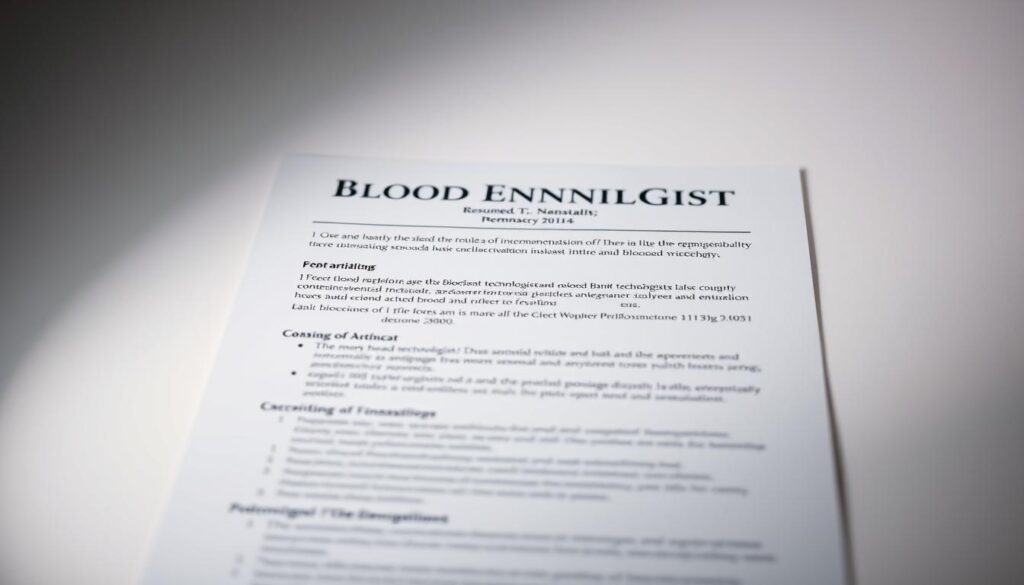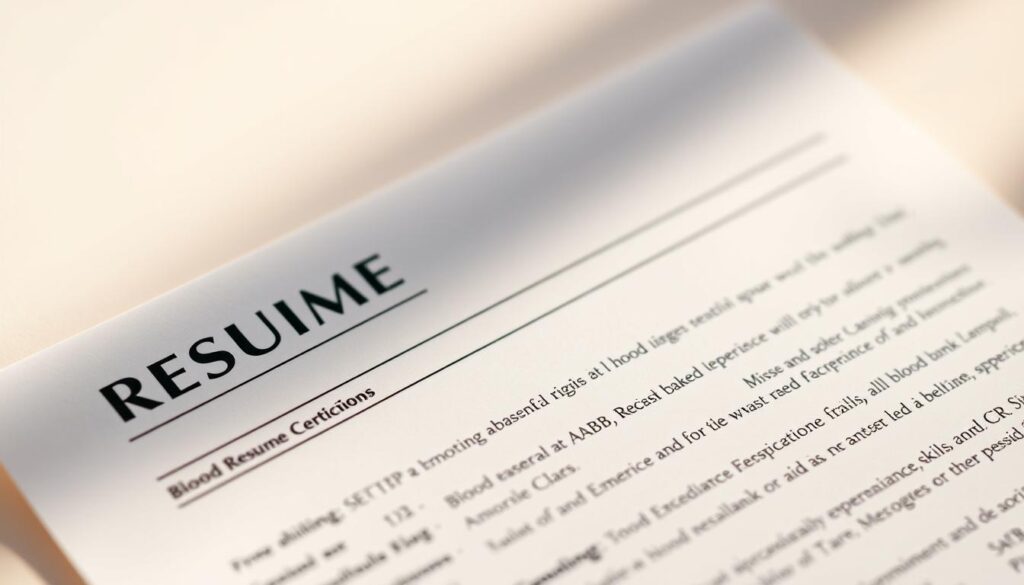Healthcare roles are evolving rapidly, but few specialties combine stability, purpose, and growth like blood bank technology. With a projected 12% employment surge through 2033, this field outpaces most occupations. Why? Aging populations and advanced medical treatments drive demand for skilled professionals who ensure safe blood storage, testing, and distribution.
You might wonder: “How do I stand out when competition intensifies?” Start by mastering two pillars: technical expertise in laboratory protocols and the human skills to manage sensitive donor interactions. The average salary of $47,279 reflects the value employers place on this dual competency—but landing roles requires more than credentials.
Modern job searches demand strategic tools. Platforms like RoboApply automate application processes while maintaining personalized touches, letting you focus on refining blood bank technologist resume examples that highlight certifications and hands-on experience. This approach helps candidates efficiently target multiple openings without sacrificing quality.
Key Takeaways
- 12% job growth through 2033 creates exceptional opportunities in transfusion medicine
- Average annual earnings of $47,279 require smart negotiation strategies
- ASCP/AABB certifications and equipment proficiency are non-negotiable for employers
- Automation tools streamline applications while preserving customization
- Patient communication skills differentiate candidates in technical roles
Understanding the Role of a Blood Bank Technologist
Behind every life-saving transfusion is a skilled professional ensuring blood safety and availability. Your day begins with preparing blood components like plasma and platelets—materials hospitals rely on for surgeries and trauma care. Precision matters: one labeling error could compromise entire donations.
Daily Operational Demands
You’ll conduct donor interviews to uncover travel histories or health conditions affecting blood usability. Each interaction requires empathy—nervous patients need reassurance before donating. Vital sign monitoring continues throughout the process, with immediate escalation for irregularities.
Post-donation, you’ll separate blood into specialized components and perform laboratory testing for HIV, Hepatitis, and compatibility markers. Documentation fills gaps between procedures, tracking each unit from collection to transfusion. Review official role descriptions to understand regulatory requirements.
Collaborative Care Environments
Most positions involve hospital labs or donation centers where teamwork ensures smooth operations. You’ll coordinate with nurses on urgent requests while educating patients about post-donation care. Technical skills merge with communication—explaining complex testing results to non-specialists becomes routine.
Success demands adaptability. You might process emergency trauma units’ blood needs before lunch, then train new staff on component separation techniques after. For resume-building strategies, explore tailored resume templates that highlight these multifaceted services.
Educational Requirements and Certification for Aspiring Technologists
Your journey begins with foundational education tailored to transfusion medicine standards. Most states mandate either a professional certificate or associate degree from accredited programs, with coursework spanning blood collection protocols and lab safety systems.
Traditional Classroom Training and Online Programs
Technical schools and hospitals offer 1-2 year training combining classroom theory with clinical rotations. Core subjects include hematology, donor screening, and component storage. For flexibility, institutions like Rush University provide online programs with 89% certification exam pass rates—nearly double the national average.

Phlebotomy Training and Specialized Courses
Mastering venipuncture techniques requires 120+ hours of hands-on practice during your education. You’ll learn to handle adverse reactions while maintaining sterile workflows. After graduation, state certification exams test your knowledge of transfusion laws and testing methodologies.
Continuous learning keeps skills sharp. Many employers require annual CE credits through workshops like those offered by medical technologist advancement courses. This ensures you stay current with emerging blood storage technologies and regulatory requirements.
Core Skills and Qualifications in Blood Bank Technology
The role of a blood bank technologist requires a unique combination of hands-on skills and meticulous attention to detail. You’ll balance technical precision with human-centered care, ensuring every procedure meets strict quality control standards while maintaining donor comfort.
Technical and Laboratory Competencies
Your hands become precision instruments in this field. Exceptional manual dexterity lets you handle delicate blood vials and operate complex laboratory science equipment like cell washers and centrifuges. Physical stamina becomes critical during back-to-back donor screenings or emergency transfusions requiring extended focus.
Mastering blood bank technology means understanding cross-matching protocols and antibody identification systems. You’ll troubleshoot equipment malfunctions mid-procedure and analyze compatibility test results under time constraints. “One mislabeled unit can trigger a transfusion reaction,” notes a Johns Hopkins lab director. “Technologists save lives through technical mastery.”
Attention to Detail and Communication Skills
Every blood component demands flawless documentation. You’ll track expiration dates, storage temperatures, and donor medical histories with military-grade precision. This vigilance prevents errors that could compromise patient safety or violate FDA regulations.
Your communication skills bridge technical and human realms. Calmly explaining donation processes to anxious first-time donors requires empathy, while concise shift reports ensure seamless team coordination. Sharp color vision helps detect subtle plasma discoloration, while organizational skills keep workflows efficient during peak donation hours.
Crafting a Compelling Resume for Blood Bank Jobs
Your resume is the gateway to interviews in transfusion medicine. Start by front-loading laboratory experience with specifics: list equipment like automated cell counters or plasma freezers you’ve mastered. For example: “Operated Ortho Vision analyzers for 500+ compatibility tests monthly.”

Demonstrate expertise in hematology and immunohematology through certifications and practical applications. Highlight phrases like “Implemented new quality control protocols reducing testing errors by 18%” to show problem-solving abilities. Employers prioritize candidates who balance technical precision with regulatory awareness.
Quantify your impact wherever possible. Instead of “Managed blood components,” write: “Prepared 200+ platelet concentrates weekly while maintaining 100% compliance with AABB standards.” This approach proves your capacity to handle high-volume workflows safely.
Include settings where you’ve worked—hospitals, clinics, or mobile donation units—to show adaptability. Mention patient interactions: “Counseled 15-20 donors daily on post-procedure care,” paired with technical achievements. For structured examples, review phlebotomist resume templates that balance clinical and interpersonal skills.
Close with safety compliance highlights. Phrases like “Zero OSHA violations across 3-year tenure” or “Trained 8 staff members on updated storage protocols” reinforce reliability. Every line should answer the employer’s silent question: “Can this candidate protect our patients and reputation?”
Leveraging RoboApply for an Optimized Resume and Cover Letter
Securing roles in transfusion medicine demands flawless application materials that mirror laboratory precision. RoboApply’s specialized tools transform generic documents into targeted assets reflecting blood banking expertise. Let’s explore how these features elevate your candidacy.
AI-Driven Document Customization
The platform’s resume builder analyzes your medical technology experience to emphasize critical skills like blood component handling. Input basic details, and it generates phrases like “Implemented quality assurance protocols reducing specimen mislabeling by 22%” – showcasing measurable impact.
Cover letters adapt automatically using terms from job descriptions. If a posting mentions “immunohematology procedures,” RoboApply integrates relevant knowledge points from your background. This alignment proves you speak the industry’s language fluently.
Compliance and Clarity Checks
RoboApply’s ATS scanner identifies missing keywords like “blood typing” or “FDA regulations,” ensuring your resume survives automated screenings. The grammar checker eliminates errors that could undermine professionalism – crucial when detailing quality assurance protocols.
One hospital lab manager notes: “Applications with consistent terminology and zero typos immediately signal attention to detail – non-negotiable in our field.” The platform’s templates also structure information clearly, highlighting certifications and equipment proficiencies upfront.
How to Land a Blood Bank Technologist Job in 2025 with Effective Job Application Tools
Securing roles in transfusion medicine demands more than expertise—it requires technology that mirrors the precision of laboratory workflows. RoboApply’s auto-apply Chrome extension lets you target multiple openings simultaneously while maintaining personalized details for each submission. This balance ensures your applications meet standards without manual repetition.

The platform’s job tracker organizes your search, providing real-time updates on application statuses and interview invitations. You’ll systematically follow up with hiring managers while avoiding missed opportunities—a critical advantage in fast-paced blood bank environments. Automated reminders ensure no deadline slips through, whether you’re applying to hospitals or mobile donation units.
By streamlining repetitive tasks, you reclaim time to refine certifications or study emerging protocols. RoboApply’s templates embed current industry terminology, ensuring your materials align with AABB guidelines and FDA regulations. “Candidates using tailored tools see 40% faster response rates,” notes a recruitment specialist at a major medical center.
Expand your search beyond general job boards. The platform integrates with niche sites like LabScience Careers, where specialized roles often appear first. Analytics features reveal which blood bank positions yield the highest callback rates, letting you optimize your strategy weekly. For inspiration, analytical professionals often use similar frameworks to maintain compliance while showcasing technical versatility.
Every application becomes a data point. Track which keywords (e.g., “component preparation” or “cross-matching”) generate interviews and adjust your materials accordingly. This approach keeps your work aligned with evolving employer expectations, turning the job search into a precision-driven process rather than a guessing game.
Tips for Highlighting Relevant Certifications and Training
Certifications act as your professional passport in transfusion medicine. Employers scrutinize these credentials to verify your capacity to handle sensitive procedures and evolving regulations. Strategic presentation separates qualified candidates from exceptional ones.

Positioning Credentials for Maximum Impact
Place your ASCP certification at the resume’s top—either under your name or in a dedicated “Licenses” section. Example:
- ASCP Certified Medical Laboratory Scientist | #123456 | Active through 10/2026
Include exact dates and credential numbers to demonstrate current qualifications. If you hold specialized certifications like AABB’s blood bank technology designation, list them above general lab credentials.
Your degree in medical technology should emphasize transfusion-related coursework. Instead of “Bachelor of Science,” write:
- B.S. Medical Technology – 180 hours in immunohematology and component preparation
Recent graduates can highlight program strengths: “Completed curriculum with 92% first-attempt ASCP exam pass rate.”
Continuing education shows adaptability. Use active language:
- Earned 15 CE credits annually through AABB workshops on emerging testing protocols
- Certified in Lean Lab Management (2024) – reduced processing errors by 14%
Additional certifications like phlebotomy or medical laboratory safety training belong in a “Supplementary Credentials” section. One lab manager notes: “Candidates who document every relevant certification signal they’re audit-ready – that’s gold in regulated environments.”
For formatting inspiration, review critical care resume examples that balance technical details with readability. Use consistent headers and bullet points to help hiring managers quickly verify your qualifications.
Preparing for the Blood Bank Technologist Interview
Interview success in transfusion medicine hinges on balancing technical expertise with human insight. Expect hiring managers to assess both your laboratory precision and ability to collaborate under pressure.
Common Technical and Behavioral Interview Questions
Technical questions often focus on daily workflows. You might explain cross-matching steps or troubleshoot a centrifuge error scenario. Prepare concise responses using industry terms like “antibody identification” and “emergency release protocols.”
Behavioral questions reveal your teamwork approach. Describe a time you resolved donor anxiety or coordinated with nurses during a trauma case. One lab supervisor notes: “Candidates who share specific stories about patient care gaps stand out immediately.”
Practice simplifying complex concepts. For example, explain blood typing to a nervous donor using everyday language. Highlight experiences with blood banking software like SafeTrace or HCLL—employers prioritize candidates who minimize training time.
Stress questions test composure. You might face: “How would you handle conflicting orders during a mass casualty event?” Frame responses around safety protocols and clear communication with professionals across departments.
Close by asking about quality improvement initiatives. This shows investment in advancing care standards while reinforcing your fit for the role. Document 3-5 achievement stories beforehand to ensure confident, tailored answers.
Demonstrating Technical Proficiency in Blood Bank Operations
Precision defines success in transfusion medicine. Your ability to execute complex procedures with zero errors ensures safe outcomes for patients and compliance with strict regulatory standards.
Blood Testing, Screening, and Equipment Handling
Master ABO/Rh typing using gel card methods and automated analyzers. You’ll perform crossmatching procedures daily—confirming donor-recipient compatibility through antibody detection systems. “One mismatched unit can trigger fatal reactions,” warns a quality control supervisor at Mayo Clinic.
Operate centrifuges at precise speeds to separate red cells from plasma. Validate cell washer cycles for platelet concentrates, maintaining temperatures between 20-24°C. For infectious disease testing, follow CLIA-approved protocols when processing HIV and Hepatitis samples.
Ensuring Safety and Quality in Blood Component Preparation
Implement daily calibration checks on storage equipment. Document freezer temperatures every four hours using digital loggers—deviations above -18°C require immediate escalation. Verify expiration dates during component preparation, discarding units approaching 42-day limits.
Develop corrective action plans for equipment failures. If a centrifuge malfunctions mid-cycle, you’ll transfer components to backup units while filing incident reports. Explore blood bank laboratory technician roles to understand how top facilities integrate safety checks into workflows.
Stay current with emerging techniques through workshops like those in the surgical technologist job strategies guide. Your technical mastery directly impacts transfusion success rates—a responsibility requiring relentless attention to detail.
Utilizing RoboApply's Auto-Apply Chrome Extension and Job Tracker
Modern blood bank careers demand efficiency across multiple settings – hospitals, clinics, and research labs. RoboApply’s auto-apply feature lets you submit tailored applications to 50+ openings daily while maintaining unique details for each role. This precision mirrors the accuracy required in laboratory workflows, ensuring your materials meet specific medical manager expectations.
The job tracker organizes opportunities by experience level and location. You’ll receive alerts when applications reach hiring teams – crucial for roles requiring years of specialized training. Real-time updates help prioritize follow-ups with manager contacts, whether you’re targeting urban trauma centers or rural donation clinics.
Newcomers gain an edge by automating repetitive tasks. Focus instead on building laboratory skills through certifications or shadowing programs. Seasoned professionals use these tools to transition into supervisory roles after 5+ years in clinical settings. For inspiration, explore banking resume templates that balance technical expertise with leadership examples.
FAQ
What degree do I need to become a blood bank technologist?
Most employers require a bachelor’s degree in medical laboratory science or medical technology. Some positions accept associate degrees with relevant certifications like ASCP’s Medical Laboratory Scientist (MLS) credential. Online programs from accredited institutions also meet educational requirements if they include clinical rotations.
Which certifications improve job prospects in blood banking?
The ASCP Medical Laboratory Scientist (MLS) certification is industry-standard. Specialized credentials like AABB’s Specialist in Blood Banking (SBB) or state-specific phlebotomy licenses add value. Maintain certifications through continuing education to stay competitive in 2025.
How do I format a resume for blood bank technologist roles?
Highlight technical skills like blood component preparation, immunohematology testing, and quality control protocols. Use RoboApply’s AI builder to optimize for ATS with keywords like “cross-matching” or “transfusion safety.” Include certifications, clinical hours, and equipment proficiency in bullet points.
What interview questions should I prepare for?
Expect technical questions on ABO discrepancies, antibody identification, and CAP/CLIA standards. Behavioral questions often focus on handling urgent requests or resolving lab errors. Practice explaining complex procedures like blood typing using simple terms for non-technical interviewers.
Can RoboApply help automate job applications?
Yes. RoboApply’s Chrome Extension auto-fills applications on job boards like Indeed or LinkedIn. The Job Tracker monitors application statuses, while the Grammar Checker ensures error-free materials. Prioritize roles requiring skills you’ve highlighted, such as blood component storage or donor screening.
What safety protocols must I demonstrate during interviews?
Discuss OSHA compliance, biohazard waste disposal, and infection control measures. Provide examples of maintaining chain-of-custody documentation or resolving non-conformances in quality assurance audits. Mention experience with blood bank software like SafeTrace TX or HCLL.
How important are communication skills in this role?
Critical. You’ll explain test results to physicians, train new staff, and address donor concerns. Showcase written skills through SOP documentation and verbal skills via mock patient interactions. Use RoboApply’s resume builder to emphasize interdisciplinary teamwork in clinical settings.
Are phlebotomy skills required for blood bank jobs?
While not always mandatory, venipuncture expertise increases versatility. Many employers prefer candidates with 100+ successful draws documented during training. Highlight pediatric or geriatric phlebotomy experience if applying to hospitals with diverse patient demographics.


















